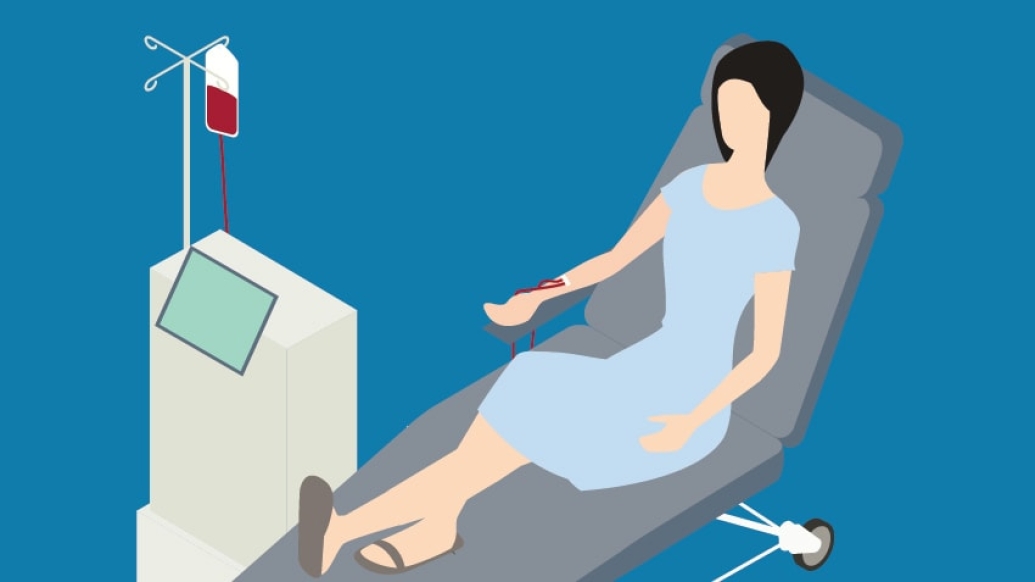A specific type of blood thinner may be a safer choice for reducing stroke risk in those who have both end-stage kidney disease and atrial fibrillation.
7:00 AM
Author |

People with irregular heartbeat due to atrial fibrillation are often prescribed blood thinners to reduce the risk of blood clots that can cause a stroke.
But for those who are also on dialysis for kidney failure, the already difficult choice of blood thinner adds even more uncertainty about associated risks.
LISTEN UP: Add the new Michigan Medicine News Break to your Alexa-enabled device, or subscribe to our daily audio updates on iTunes, Google Play and Stitcher.
One reason: Patients on dialysis are routinely excluded from clinical trials, which test the utility and safety of such treatments.
An observational study published in Circulation is the first to reveal that one anticoagulant, apixaban (also known as Eliquis), may be safer for this patient population.
The risk of major bleeding was about 30 percent less for dialysis patients on apixaban compared with warfarin, the study found.
"These are the first data to show that apixaban is potentially safer than warfarin in dialysis patients with atrial fibrillation," says Konstantinos Siontis, M.D., the study's first author, who recently completed a cardiovascular fellowship at Michigan Medicine's Frankel Cardiovascular Center.
"We found patients on apixaban had a significantly lower risk of major bleeding with no difference in stroke, which is what we try to prevent by prescribing these anticoagulants."
To reach this conclusion, the team studied patterns of apixaban use and associated outcomes in more than 25,000 Medicare beneficiaries as a research project undertaken by a team at the United States Renal Data System Coordinating Center, based at the University of Michigan.
During the five-year study period, apixaban was increasingly used; about 1 in 4 new blood thinner prescriptions in 2015 were for apixaban.
A complicated calculation
If blood isn't completely pumped out of the heart because of atrial fibrillation, it can pool into clots and cause a stroke, leading clinicians to prescribe blood thinners to reduce the clotting risk.
MORE FROM THE LAB: Subscribe to our weekly newsletter
The anticoagulation landscape for all patients continues to change as new agents — including apixaban — become more popular. Mainstay warfarin (also known as Coumadin) is still widely used in the general population.
Warfarin is difficult to manage, however, and comes with the risk of major bleeding.
Siontis says there's uncertainty about whether adding dialysis to the mix means an anticoagulant is still a good idea for someone with Afib, given the safety and bleeding concerns.
Of the four novel anticoagulants, two (dabigatran/Pradaxa and rivaroxaban/Xarelto) have already been associated with higher bleeding rates in dialysis patients compared with warfarin, leaving researchers to focus mainly on apixaban in their push to come up with an alternative, safer anticoagulation plan for these patients.
"Atrial fibrillation is a pretty significant determinant of adverse outcomes in this population," Siontis says. "It's a common problem in dialysis patients, who generally have a lot of comorbidities. And the patients on dialysis who have Afib experience higher rates of stroke compared to patients with Afib who aren't on dialysis."
Need for more data
Although clinical trials have investigated the use and outcomes of anticoagulants in Afib, the most common form of heart arrhythmia, their findings cannot be applied to people on dialysis in the same way as other patients.
That's because the comorbidities and other worse outcomes associated with kidney failure and dialysis lead most researchers to exclude this population from clinical trials, Siontis says.
"Patients on dialysis are one of the most challenging populations because they have many comorbid conditions, are often on many prescription drugs and are at significant risk of kidney failure-associated and treatment-related adverse events," says senior co-author Rajiv Saran, M.D., a nephrologist at Michigan Medicine and director of the United States Renal Data System Coordinating Center at U-M. "Dialysis patients were excluded from all randomized trials that established the utility of the newer anticoagulants, including apixaban."
SEE ALSO: Medication Adherence a Problem in Atrial Fibrillation Patients
But in the general population, apixaban has been used safely and widely, Siontis says.
"It's one of the agents that's been successful in the general population, but we know very little about dialysis patients specifically," he says, despite Food and Drug Administration approval of updated labeling for apixaban in dialysis patients.
Siontis says these clinical outcomes data, while important, are only the first step.
"It's useful for clinicians to have this information now as we are waiting for the results of important randomized trials that are underway and compare warfarin to apixaban in dialysis patients," Siontis says. "The combination of dialysis with atrial fibrillation is a difficult one, but as we learn more from real-world data and clinical trials, we are hopeful that the decision-making will be better informed in the near future to the benefit of these patients."

Explore a variety of health care news & stories by visiting the Health Lab home page for more articles.

Department of Communication at Michigan Medicine
Want top health & research news weekly? Sign up for Health Lab’s newsletters today!





